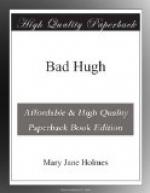“It makes me hate myself,” he said, groaning aloud, “that I should suffer a girl like her to pay for the bread she eats. Oh, poverty, poverty! It is a bitter drug to swallow.” Then like a brave man who saw the evil and was willing to face it, Hugh came back to the original point, “Where should they get the money?”
“He might borrow it of Alice, as ’Lina suggested,” Mrs. Worthington said, timidly, while Hugh almost leaped upon the floor.
“Never, mother, never! Miss Johnson shall not be made to pay our debts. There’s Uncle John’s gold watch, left as a kind of heirloom, and very dear on that account. I’ve carried it long, but now it must go. There’s a pawnbroker’s office opened in Frankfort—take it there this very afternoon, and get for it what you can. I never shall redeem it. There’s no hope. It was in my vest pocket when I was taken sick.”
“No, Hugh, not that. I know how much you prize it, and it’s all the valuable thing you have. I’ll take in washing first,” Mrs. Worthington said.
But Hugh was in earnest, and his mother brought the watch from the nail over the mantel, where, all through his sickness it had ticked away the weary hours, just as it ticked the night its first owner died, with only Hugh sitting near, and listening as it told the fleeting moments.
“If I could only ask Alice what it was worth,” she thought—and why couldn’t she? Yes, she would ask Alice, and with the old hope strong at her heart, she went to Alice, whom she found alone.
“Did you wish to tell me anything? Hugh is better, I hear,” Alice said, observing Mrs. Worthington’s agitation, and then the whole came out.
“’Lina must have fifty dollars. The necessity was imperative, and they had not fifty to send unless Hugh sold his uncle’s watch, but she did not know what it was worth—could Alice tell her?”
“Worth more than you will get,” Alice said, and then, as delicately as possible she offered the money from her own purse, advancing so many reasons why they should take it, that poor Mrs. Worthington began to feel that in accepting it, she would do Alice a favor.
“She was willing,” she stammered, “but there was Hugh—what could they do with him?”
“I’ll manage that,” Alice said, laughingly. “I’ll engage that he eats neither of us up. Suppose you write to ’Lina now, saying that Hugh is better, and inclosing the money. I have some New York money still,” and she counted out, not fifty, but seventy-five dollars, thinking within herself, “she may need it more than I do.”
Easily swayed, Mrs. Worthington took the pen which Alice offered, but quickly put it from her, saying, with a little rational indignation, as she remembered ’Lina’s heartlessness:
“I won’t write her a word. She don’t deserve it. Inclose the amount, and direct it, please.”
Placing the money in an envelope, Alice directed it as she was bidden, without one word of Hugh, and without the slightest congratulation concerning the engagement; nothing but the money, which was to replace Ellen Tiffton’s bracelet.




